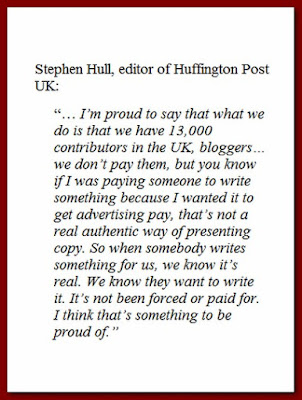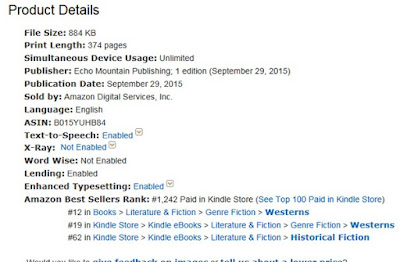Kindle Countdown Deal & Promotion Sites
Last
week, I talked about deciding which platforms to publish on and why I enrolled
in KDP Select. Another reason I wanted to try Select was the promotional tools
it offers exclusively to Select authors.
A sale is a great way to tempt readers into trying a new
author. It’s a tricky proposition, though. Finding the right price point,
timing, and promoting the sale are pieces of a puzzle which is missing the
picture on the front of the box—and a four year old likely fed some of the
pieces to the dog. Corner pieces. %*#&$! It’s a lot of trial and error.
KDP Select offers three promotional tools: Free Days, Kindle
Countdown Deal, and Ads.
(I’ll address Ads next week, because they’re a whole other can of worms.)
Free days can be useful, because everyone likes free stuff,
right? However, they’re not particularly useful for debut authors. For an
author with a series or backlist, offering one book for free can entice readers
to try it and then buy other books. But debut authors got nothin’. We’re
standing there with our one pitiful book, saying, “Sorry, still working on the
next one.” The reader
probably won’t remember us by the time the next book comes out. We gave away our work for little to nothing in return. So I don’t
recommend using free days unless you can point readers to another book they’ll
pay for.
Kindle Countdown Deal, on the other hand, can be a great
tool for debuts. A discount means less risk for readers with a new author, but
you still get some royalties. And, if your regular price is 2.99+, a Deal still
nets 70% royalties, instead of 35% (you only get 35% if you just drop the
regular price under 2.99.)
You can only use it once during a 90 day Select enrollment. It can
run from 1 to 7 days and have up to three price increments. Amazon shows the
regular price so readers know it’s on sale and a countdown clock, which can
create a sense of urgency. So it might look like this:
Regular Price: $2.99, 3 day sale
Day One: 99 cents and the clock shows 1 day, 12 hours until
price increases to 1.99.
Day Two: 1.99 and the clock shows 1 d, 12 h until sale ends
and price goes back to 2.99.
I tried a 7 day Deal the weekend after Thanksgiving, with
hopes of catching some of the Black Friday/Cyber Weekend frenzy. It goes
without saying my goal was a big bump during the sale. But I also hoped for residual
sales over the holiday season, in part due to an expected increase in ranking (bestseller
list) and better visibility.
I set up the sale, created ads on various outlets, and
scheduled listings with several promotion sites in advance. In addition to my
advertising of the sale, Amazon lists Deals in their own search category and
promotes them—unfortunately, they don’t offer any analytics for sales that come
from that specific page/promotion.
In the weeks leading up to the sale, I averaged a little
over 1 sale/day and a little over 1 “sale”/day for KU (based on number of pages
read, where the equivalent of one book read actually nets higher royalties than
1 regular sale for my price point and pages.) So I was at about 2.5 books per
day. My ranking was hovering between #20k and 100k in overall Kindle sales and
around #300-5000 in my genre categories (which isn’t bad, especially since my
genres aren’t obscure ones.)
I used 2 increments, with the initial price at 99 cents and
an increase to 1.99 halfway through the sale. Here’s what happened:
The sale worked well, but not fantastic. I got a great bump
in sales and ranking, but not quite as high as I expected. During the sale, I
netted 232 sales. The KU benefit was more residual, since it’s based on when
they read, not when they download. In the month after the sale, I ended up with
no increase in sales over the previous month, but a slight increase in KU reads
(1.2 books per day to 1.7). My ranking increased significantly, up to #1200 in
Kindle sales and #12, 19, and 62 in each genre category. But I didn’t break the
top 100 overall or top ten in genre, as I’d hoped.
I suspect timing was the issue. Because the sale ran over
Black Friday/Cyber Monday, while Amazon put almost ALL books on sale, I was
competing against other books on sale. It simply couldn’t compete against the big
names that were also on sale and getting bumps in ranking. I’d failed to
consider that competition. So when I do another Deal, I’ll try to schedule it
for a quieter period when competition won’t be as strong. (Another tip is to
not do a sale during a big event, like the Super Bowl, as people are occupied
elsewhere and not shopping.)
As for the promotion sites I used, I booked promotions 2-3
weeks ahead of time.
Paid: Books Butterfly, Ereader News, Booktastik, BettyBookFreak
Free: eBookLister, Choosy Bookworm, and Fussy Librarian.
The only site that seemed to drive significant sales was Books Butterfly—it is expensive
($50* and up), but it did pay for itself. They guarantee a certain number
of sales and offer a pro-rated refund if you don’t hit that threshold (there are restrictions on this, though--read the fine print.) They also offer special analytics that are helpful. For me, they were well worth the investment.
*UPDATE: I went back to schedule a new promo with Books Butterfly and found, to my disappointment, they have raised their prices while lowering the number of guaranteed sales. I'm more luke-warm in my enthusiasm now. The ROI is much more iffy at their new prices, because unless the sales nearly triple their guarantee, the promo won't pay for itself. It's entirely possible for the sales to do that--overall mine were at least double--but it's a very thin line . There's also still the ranking benefit to consider, which is worth a lot if it hits the right level. But...where'd I leave my waders?
Ereader News is also expensive ($35 and up), but I saw little
or no sales I could attribute to it. I wouldn’t use them again. Booktastik and
Betty were inexpensive ($8-10); if they drove any sales, it was a small amount,
but since they’re cheap, I might use them again. EBookLister had no appreciable
impact, but since it’s free, no harm no foul. Again, any of the sites’
effectiveness may have been limited due to the timing of the sale, but I think
that’s minimal. Some promotional sites do better in different genres, I believe, so do your research.
[Choosy Bookworm and Fussy Librarian didn’t have available slots during the sale,
so CB didn’t run one, and FL ran it after the sale. FL had no impact when it
did run. If you choose to use them, you’ll need to schedule well in advance (ie
at least a month.)]
The overall ROI was around 60%, which is a very good ROI in
absolute terms. That doesn’t include time invested, however, and I spent a lot
of time on the sale, creating graphics and posting for the promotion on social
media. And while I loved the sales, missing the goal for ranking and exposure
was disappointing.
I think a more effective use of the Deal is shorter length and
few increments (3-4 days, one increment) and better timing. I intend to use the
Deal again shortly, and hope for even better results. We’ll see….
Next week, I’ll discuss a Goodreads Giveaway and the
pay-per-click ad options on Goodreads, Amazon, and Facebook. Keep the waders
handy and order an extra truckload of wine.












